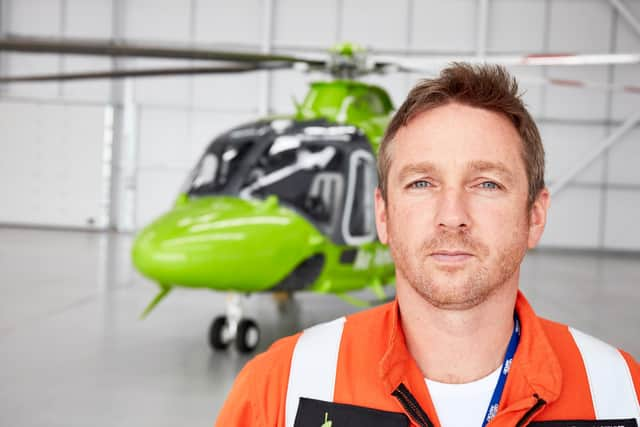Lockdown no obstacle for war veteran saving children's lives in Doncaster
and live on Freeview channel 276
As a pilot with the Army Air Corps he was sent to notorious war zones including Iraq and Afghanistan to support British troops in military helicopters.
Nowadays things are very different for Wayne – but he still has a job that involves life or death situations.
Advertisement
Hide AdAdvertisement
Hide AdSince leaving the forces after 22 years service, the 46-year-old dad of two is now part of a different front line – that of the NHS.


After a spell on emergency air ambulances which respond to 999 calls, he is now flying children around the UK from hospital to hospital as part of the Children’s Air Ambulance, based at Doncaster Sheffield Airport.
“I flew several types of helicopters with the military, such as Lynx and Gazelles. I had to go places like Itaq and Afghanistan. We’d be doing things like top cover for convoys, looking for hazards.
“I bumped into Prince Harry a few times, while I was doing helicopter trials and development at Middle Wallop, at the same time as he was doing his training there.”
Advertisement
Hide AdAdvertisement
Hide AdWayne left the army in 2015 – and started a job as a civilian pilot with Specialist Aviation Services – a firm which provides pilots to some of Britain’s emergency services.
After initially working for Humberside Police, he spent time working for air ambulances, flying out to the scenes of emergency incidents to pick up the injured.
But when the Doncaster job came up, he was earmarked for the role, moving to Dunsville, Doncaster, to live near work.
His job now sees him transport seriously ill children who require specialist treatment at a particular hospital. For instance, he may take a poorly child from Doncaster Royal Infirmary to Great Ormond Street Hospital in London, if they need urgent specialist treatment there, and the journey has to be quick.
Advertisement
Hide AdAdvertisement
Hide AdWhen you get a lift with Wayne, Cornwall is two hours away. Glasgow is perhaps 90 minutes.
Despite the lifesaving nature of the work, he does not usually find out what happens to the patients he transports. The pilots are not told, to help them think clearly without any emotional involvement with the family or the child.
“The job keeps you on your toes, although here, a job will come in and you can be doing that for the whole day – picking the patient up, dropping them off, and taking their medical team back from where you picked them up. It can be eight or nine hours, in all weathers.
“But we never get told what the child’s illness is – we are kept out of that to focus on the flying. We will always get where we are going as quickly as we can, but nice and safely. I think the feeling is you could get emotionally attached if you spoke to the families.
Advertisement
Hide AdAdvertisement
Hide Ad“Most of us have kids and could easly empathise. I’ve got two daughters aged seven and 11.”
The only time Wayne has met the parents he has helped has been at press and PR days,when they have been brought in to speak to the press. And he admits it is nice to see the children fit and healthy and know he has helped them.
Wayne does have a feeling of what parents are going through. One of his daughters was born a month early, and with breathing problems.
“It was touch and go if she was going to come through,” he said. “It was a terrible experience.
Advertisement
Hide AdAdvertisement
Hide Ad“I think it does mean I empathise with the parents and can put myself in their shoes a bit. My daughter was a month early and had bad breathing problems. We almost lost her twice. She was in the special care baby unit, but the difference was, she didn’t have to be moved to another hospital. But I have a sense of what the parents are going through.
“I can’t thank the hospital in Hereford enough for what they did for her then.”
Work is continuing for Wayne, despite the current lockdown.
His service is still needed, but he now has full personal protective equipment when he is loading up. The children are tested for Covid 19 before they fly, but the health workers are still going in and out of the hospitals, so the PPE is needed.
When he gets behind the controls however, he can take his apron and goggles off – he needs to put on the helmet he wears to fly, which has its own visor.
Advertisement
Hide AdAdvertisement
Hide Ad“It adds a bit of time to loading and unloading, but it’s safe,” he said.
The lockdown has had an effect on what Wayne can do in his spare time though.
It not just when he is at work that Wayne like to get into the air. In his spare time he like to do a hobby called speed flying.
Speed flying is a sport based on the principles of paragliding, but using a specially designed wing to fly fast hill descents. The fly down the hills at low altitude, but that has had to be paused for now..
Advertisement
Hide AdAdvertisement
Hide Ad“It can take me 45 minutes to walk up a hill carrying the wings, and then it’s just a few minutes to get down again, using them,” he said. He says he has scaled back from some of his previous hobbies hobbies. He had previously enjoyed base jumping, which involves parachuting from fixed points like high buildings.